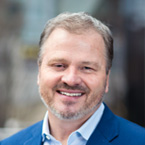“Everyone Said it Wouldn’t Work,” but an AACR Grant Helped Michael Jensen Prove Otherwise

For Michael Jensen, MD, a grant from the AACR came at a good time.
It was 1996, and Jensen was at the Fred Hutchinson Cancer Research Center in Seattle for his fellowship as a pediatric oncologist-hematologist, working in the laboratory of Phil Greenberg, MD. Jensen was interested in the burgeoning field of harnessing the human immune system to fight cancer.
At the time, skepticism about cancer immunotherapy was rampant.
“Everyone said it wouldn’t work,” he recalls. At scientific meetings, he remembers, “we would all be presenting on the last day in the last session, and there would be as many A.V. people in the room as there were presenters.”
“That has radically changed these days,” he chuckles.
But in ’96, Jensen was focused on trying to isolate T cells specific for tumor antigens in glioblastoma multiforme – a brain cancer with a very dismal prognosis – to see if the tumor responded to T-cell therapy. His research was assisted by an AACR Research Fellowship in Clinical/Translational Research (supported by Amgen). Through laboratory work and clinical trials supported in part by the grant, he had to conclude that it was very difficult to demonstrate that those responses existed.
“That actually inspired me to go in a different direction, one that has been at the heart of the last 25 years of my career,” he says. “If the T cells don’t naturally exist, can we genetically engineer them to express synthetic antigen receptors to be tumor specific?”
At his next stop, at City of Hope Comprehensive Cancer Center, Jensen plunged into the biotechnology needed to start with a few cells from the patient and produce enough CAR T cells to effectively attack the cancer.
“Getting that award and taking on the armor of translational research really put the fire in my belly that I didn’t want to stop with curing mice,” he says. “I wanted to take this research and start curing kids.”
Chimeric antigen receptor (CAR) T cells are now one of the major components of immunotherapy. At Seattle Children’s Research Institute, Jensen’s laboratory is running more than a dozen clinical trials of T cells for pediatric cancers including leukemia, solid tumors, and brain tumors. He hopes to spare more children the life-altering impact of radiation to the brain by improving T cell therapy for glioblastoma and other brain tumors.
Among other things, Jensen hopes to see immunotherapy improved to the point at which it will be the first treatment for leukemia, with chemotherapy and bone marrow transplants reserved for patients who relapse.
After 25 years of experience developing a technology once dismissed as an impractical novelty, Jensen says he has learned a valuable lesson.
“If you believe in something, persevere, persevere, persevere,” he says. “Just don’t give up.”